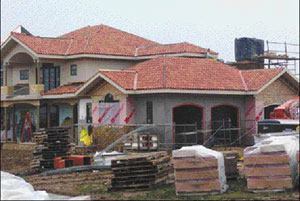Contrary to common belief roofing tiles are not blown off a roof.
Ridge tile blown off roof.
It should have cement put underneath and then once laid into position the ridge tile should be pointed on the outside to fix it to the last row of tiles.
Broken ridge tiles and their replacement.
Wind doesn t break good mortar otherwise you d have chimneys crashing down and ridge tiles flying off every time we had a storm.
This leaves the roof susceptible to roof blow off in the event of strong winds.
We just don t get that much of it.
What you need to do first of all is get a decent ladder wear protective gear and get to the ridge.
After hurricane andrew in 1992 our code system was completely redesigned.
Ridge tiles will only blow off if the mortar has already failed.
Each tile has two predrilled screw holes.
It is important to understand this subtle distinction in order to build a more secure roofing system.
Where one shingle tab blew off your roof you have a 1 in 3 chance that the missing shingle was sitting directly above an open seam between the shingles below.
That s because this type of roof shingles standard 3 tab asphalt shingles are installed side by side with the next upper row of shingles covering the side seams between the lower row of shingles.
Tiles on the ridge and eaves of the roof are especially susceptible to wind.
Tiles are designed to be installed using special stainless steel screws as per code.
Roof shingles are normally installed over roofing felt and this can provide some temporary protection in case a shingle or two has been blown off.
This is not strong enough to withstand water for long periods.
Long before a ridge tile blows off you would see this mortar coming loose in our case it took 25 years we heard it rolling down the roof during high winds.
Contact a professional roofer to assess the damage of the roof.
Even with roof felting in place water can also make its way between the felt s seams resulting in leaks.
Now get rid of all the ridge tiles one by one.
So when it does happen the extreme wind can catch a tile and blow it off the roof.
If a wide screw or nail is used it will crack the tile.
Now inspect the ridge tiles thoroughly and look out for the ones that have come out.
The wind creates an upward force as it travels over the roof causing the tiles to be sucked upwards.
It s more likely that the roofer who installed them didn t use the correct sand and cement mix as it seems to be a lost art these days.

